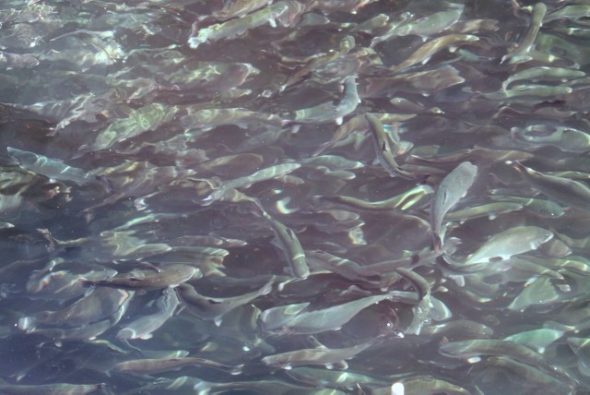Chairperson at the session: Antti Kause (Luke, Finland)
In recent years, advancements in enabling technologies have lead to completely novel innovations that are now being implemented within the aquaculture industry. The three Horizon 2020 EU-projects, AquaIMPACT, FutureEUAqua and iFishIENCi, funded under the topic ‘Sustainable European Aquaculture 4.0: Nutrition and Breeding Innovations’ held a common session on these topics at Aquaculture Europe 2019 (AE2019) congress. It is one of the largest aquaculture congresses bringing together industry and research in the field of aquaculture. This session covered the latest developments in the interacting fields of digital information technology, genomics and circular economy applied in farm management and monitoring, fish nutrition, feeding and selective breeding.
The session was the first common outreach action between these three recently started projects, and also the ‘NewTechAqua: New Technologies, Tools and Strategies for a Sustainable Resilient and Innovative Aquaculture’ project starting in January 2020. The session started with an overview of the projects after which each project contributed scientific presentations with the first results.

Genomic selection becoming the industry standard
The session introduced genomic selection that is developing fast to become the industry standard for aquaculture breeding programmes. Genomic selection means that the DNA profile of an individual is used to predict its potential to transmit genes of preferred traits to the next generation. Implementation is pioneered by the Atlantic Salmon industry. For any breeding programme, a major obstacle is to reduce genotyping costs and to create cost-effective phenotyping of thousands of individuals under commercial conditions for challenging traits such as fillet pigmentation, disease resistance and feed efficiency, the traits that benefit the most from genomic selection. The session demonstrated that optimization work and power calculations can be used to find economically feasible production plans and experimental designs for both industry and research use.
Nutrition to match fish genetics and production types
Since 2000 there has been an increasing demand for seafood that has been farmed according to certified organic standards, notably in European countries. The session portrayed the need to design commercially relevant, safe, nutritionally adequate feeds with low environmental impact for organic aquaculture using feeding protocols that match the natural feeding behaviour and origin of fish stocks. The session further reviewed the evidence that breeding programmes change fish traits that are related to nutritional requirements. These traits include growth, feed conversion ratio, lipid deposition and fillet%, but also specifically lipid metabolisms, protein retention and adaption to plant-based diets. Feeds hence need to be matched to the genetic characteristics of fish from breeding programmes.
The data from rainbow trout farms showed that breeding and feed development has had a strong favourable impact on economics and environmental footprint at farm-level (up to 70% reduction in nitrogen and phosphorus loading to water from 1980’s onwards). Further improvements can be obtained, for example, by genomics and novel nutritional innovations describe above as well as by digital technology.
Emerging digitalisation technologies
The session illustrated that integrating internet-of-things technologies (IoT), such as semantic Web and artificial intelligence and sensors in aquaculture farms provide possibilities for a new era of connected, responsible and efficient aquaculture. On-line connected sensors can, in one hand, record environmental and water conditions, oxygen, temperature, salinity, sea current, pH, wind and CO2, and on the other hand, fish condition and performance such as biomass, moving activity, oxygen consumption, and standard metabolic rate. This compels the development of new IoT oriented applications in order to collect and control data from heterogeneous sources, and organise it in an inter-operable way to improve the decision-making, production control and management for fish aquaculture systems.
The dialog and the wrap-up
The presentation on Life Cycle Assessment (LCA) of emerging technologies and circular economy induced active conversation among the audience. Increasing the consumer awareness on aquaculture processes and products is one major goal that will benefit from dialog between industry, consumers and other stakeholders. The three Horizon 2020 EU-projects are motived to be part of the dialog.
The three projects in question are:
- AquaIMPACT – Genomic and Nutritional Innovations for Genetically Superior Farmed Fish.
- FutureEUAqua – Future growth in sustainable, resilient and climate friendly organic and conventional European aquaculture.
- iFishIENCi – Intelligent Fish feeding through Integration of Enabling technologies and Circular principles.
In these projects, researchers and companies together develop aquaculture practices for more robust, healthy, nutritious and resource-efficient farmed fish corresponding to the UN’s Sustainable Development Goals.
